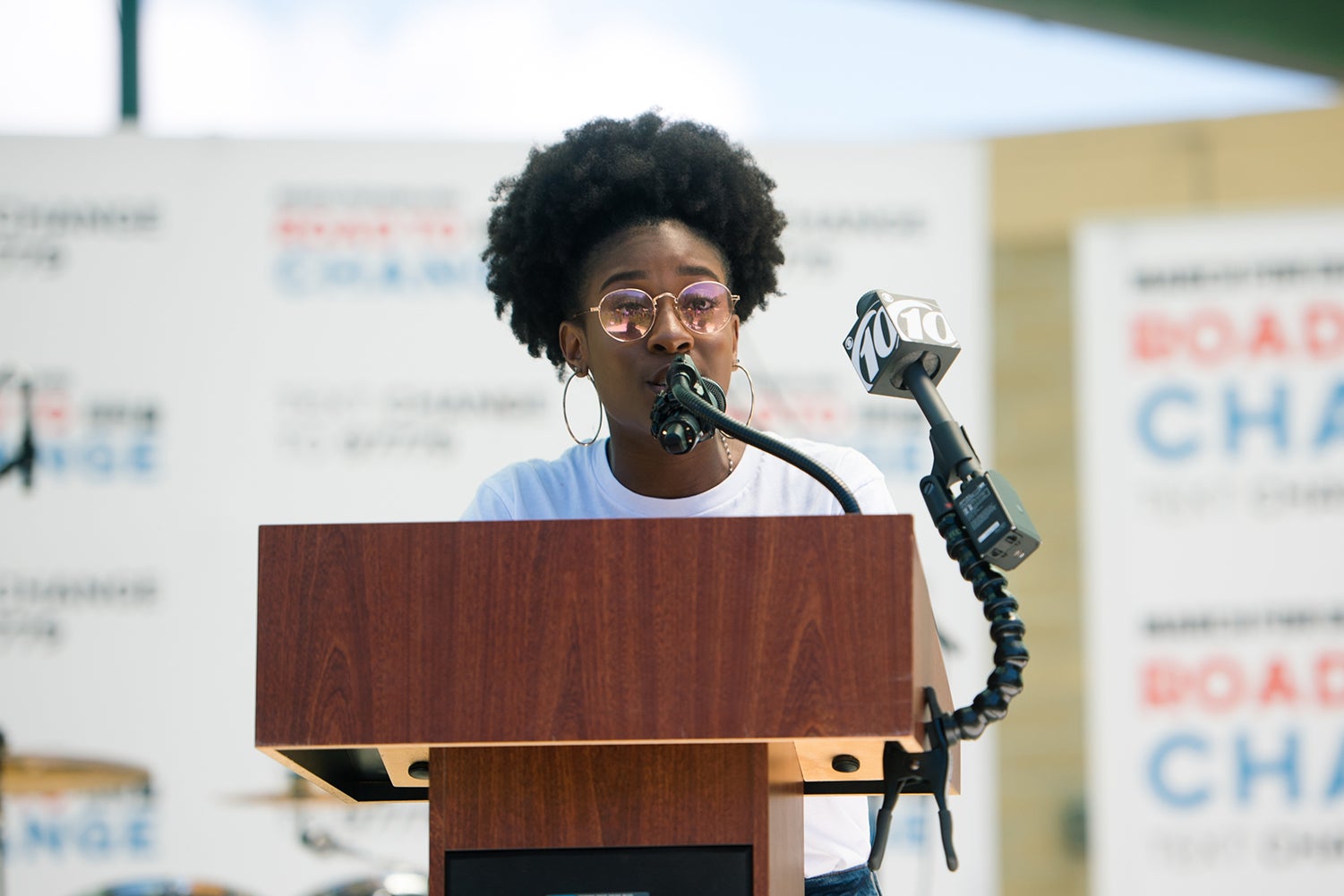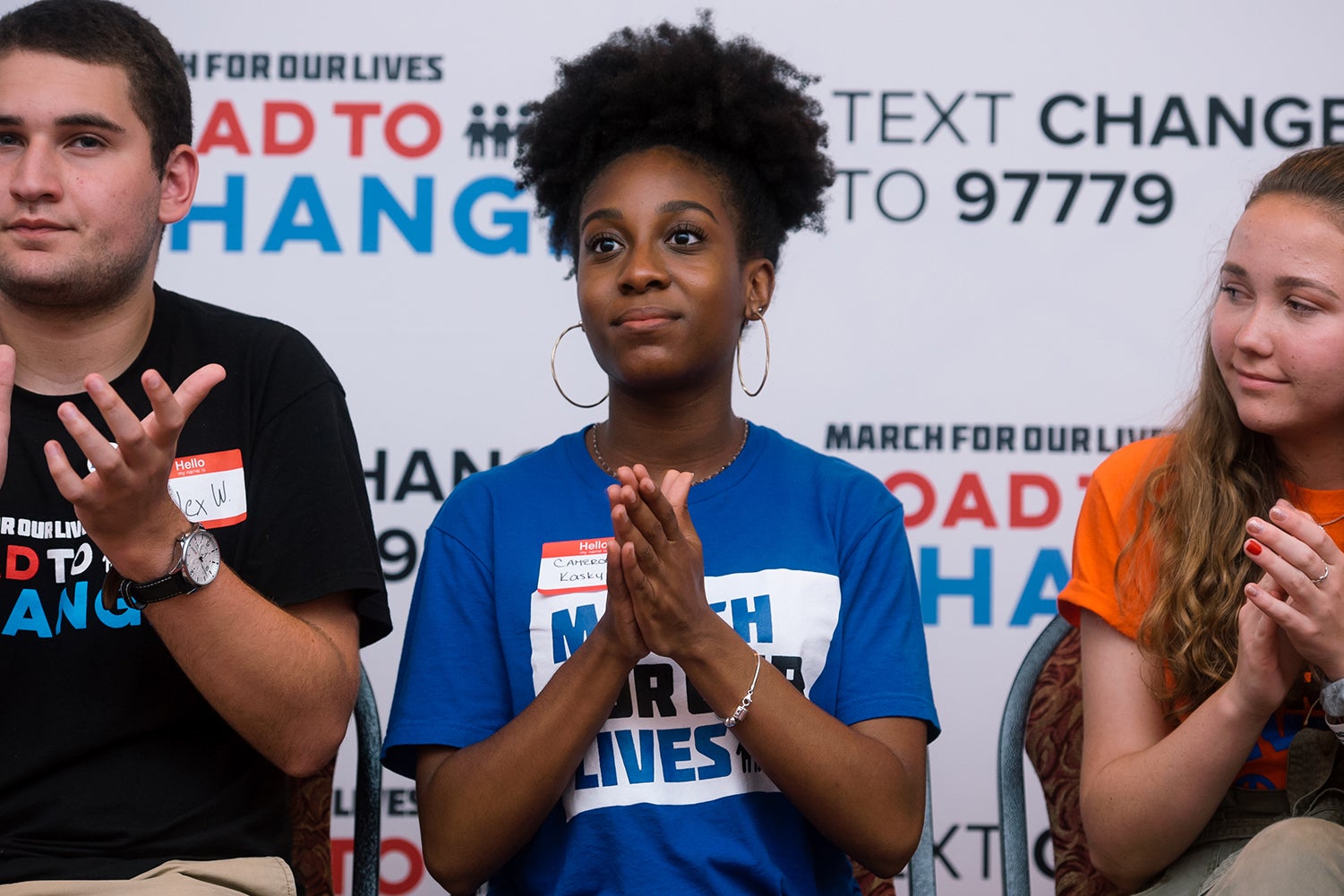Joining Stanford: A passionate activist
Since surviving one of the country’s worst mass shootings, Tyah-Amoy Roberts has become a prominent and passionate advocate for safer communities. Today, she is among the members of the Stanford Class of 2023.
Last year’s deadly mass shooting at Marjory Stoneman Douglas High School in Parkland, Florida, sparked an overwhelming response from students who survived. Determined to bring the issue of gun violence to the forefront of the American debate, the students have taken their activism across the nation in the hope of reforming gun policy and saving lives.

Tyah-Amoy Roberts, ’23, discusses gun violence at an event during the March For Our Lives: Road to Change tour in 2018. (Image credit: Emilee McGovern)
Among those activists is Tyah-Amoy Roberts, who, since the tragedy, has realized that her passions reach far beyond her love for debate team competitions and chemistry classes.
“I think there might have always been a quiet activist in me,” she said.
Since the shooting, Roberts has found her voice in a growing grassroots movement – driven by young Americans – to improve the safety of people nationwide. As a member of the board of directors of March For Our Lives, she has worked to increase voter registration in numerous states and helped organize demonstrations that convene millions of people across the country and the world. She and her colleagues are also capturing the attention of U.S. presidential candidates with their new plan to end gun violence in America.
Roberts’ steadfast activism, political involvement and academic accomplishments are among the qualities that earned her a spot in the Stanford Class of 2023. She arrives on the Farm with interests in chemistry and bioengineering.
Finding her voice
Roberts was born and raised in Broward County, Florida, and enrolled at Marjory Stoneman Douglas High School in the fall of 2015. Starting her freshman year was an unnerving experience for Roberts, who didn’t know anyone else at the school. But she quickly made friends, enrolled in AP classes, joined the debate team and developed a passion for chemistry.
“It was pretty normal,” she said of her early high school experience.
But that all changed on Valentine’s Day 2018, when a gunman entered her school, killing 17 people and wounding many more. The tragedy became one of the worst mass shootings in the nation’s history – and the deadliest one at an American high school. Afterward, Roberts’ concern for the well-being of her friends and classmates intensified.

Tyah-Amoy Roberts and her classmates from Marjory Stoneman Douglas High School attend an event during the March For Our Lives: Road to Change tour in 2018. (Image credit: Emilee McGovern)
“I was checking on my friends constantly,” she said. “Most of my relationships got stronger because I needed to make sure everyone was OK. I felt like that was my responsibility.”
That responsibility quickly turned into a vocation for Roberts. In the weeks following the shooting, she and her classmates rallied and launched Never Again MSD, a political action committee working to prevent gun violence. They created the Twitter hashtag #neveragain, which quickly gained traction and garnered the activists support from across the country. They organized the March For Our Lives demonstration on March 24, 2018, in Washington, D.C., which attracted an estimated 2 million attendees and spawned hundreds of similar demonstrations nationwide.
Being on stage at the demonstration and looking out across a sea of protesters was a surreal and hopeful experience for Roberts. But it also reminded her that such actions are a special tradition in the United States, and that gun violence is an issue many activists before her have worked to solve, particularly in minority and low-income communities.
“It felt like we were paying respects to others who came before us, who had demonstrated for other movements, like the civil rights movement, since the start of this nation,” she said.
Following the rally in Washington, D.C., the March For Our Lives organization continued to gain momentum. Roberts and her fellow activists traveled the country, visiting colleges and universities, and communities affected by gun violence. They visited state capitols, lobbied politicians and campaigned for various legislative initiatives. Along the way, they brought more Americans into the political process by registering 50,000 new voters ahead of the 2018 mid-term elections. And just last month, March For Our Lives unveiled a comprehensive strategy to address gun violence in the United States. The “Peace Plan for a Safer America” offers sweeping policy proposals, including changing the standards for gun ownership and naming a national director of gun violence prevention.
“Many presidential candidates have expressed at least partial support for the plan, and we think that’s a huge victory,” Roberts said. “No matter the outcome of the 2020 election, we know gun violence prevention will be a priority.”
On the Farm
Roberts’ activism continued into her senior year at Marjory Stoneman Douglas High School, from which she graduated last spring. Her work, along with top academic achievements, helped her gain acceptance to Stanford, which she said was her first-choice school.
“At Stanford, there’s room to explore,” she said. “It feels like a freer environment to be myself, but also to strive for academic excellence.”
Roberts is excited to live in Ujamaa and engage with Stanford’s black community. She also wants to expand on her passion for science and plans to major in bioengineering.
As she begins this next chapter of her life, Roberts said she has no intention of leaving behind her activism work. While she’s in the Bay Area, she intends to connect with other activists that share her passion for creating safer communities.
“I think I’ll be doing this forever, even if it’s not what I do professionally, because I am so passionate about it and ensuring people are safe at school, work, at the movies, wherever,” she said. “I’ll always fight for that and I’ll always fight for people.”
